 |
 |
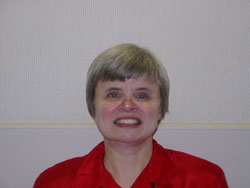
|
|
Debby Hill, M.S.W., National Institute on Alcohol Abuse and Alcoholism, Laboratory of Clinical Studies, National Institutes of Health, Bethesda, Maryland
|
1. I chose this career because...
2. My typical workday involves...
3. Equipment I use on the job...
4. What I like best/least about my work...
5. My career goals are..
6. When I'm not working, I like to...
7. Advice on facing challenges to succeed...
|
|
1. I chose this career because...
|
Back to Top

|
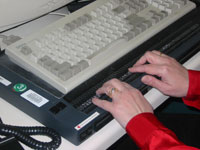
|
|
Debby Hill uses a PowerBraille display. It provides braille output from the computer.
|
I chose to become a social worker, because of two interests that I developed. In grade school, I became very interested in medicine. At the time, I wanted to be a doctor or a nurse. When I grew older, I decided that it was not practical for me to pursue that dream, since I am blind. (Later, I discovered that there are doctors who are blind and nurses with partial vision.) But despite that decision, my interest in medicine remained.
My second interest developed when I was working in Harrisburg, PA, in the early 1980s. I became a volunteer for a telephone hotline. I was trained in supportive listening, crisis intervention and making referrals to various community services. I enjoyed helping people, working with them to solve problems, and giving them a friendly and safe means to express their concerns. Because I found the position so fulfilling, I decided to go back to school for a master’s degree in social work. While researching this choice, I discovered that social workers provided services to patients and families in hospitals and clinics. That was the clincher: I resolved to become a medical social worker.
After receiving my master’s degree, I joined the NIH as a research social worker, and got my wish to work in medicine.
Education
- Bachelor of Arts, Mathematics, Bucknell University, Lewisburg, Pennsylvania
- Master of Social Work (MSW), Virginia Commonwealth University, Richmond, Virginia
|
|
2. My typical workday involves...
|
Back to Top

|
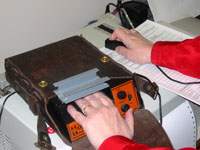
|
|
Debby Hill uses an Optacon - a miniature camera that transmits the shapes of printed letters to an array of pins where can be felt by an index finger.
|
My typical workday is not very structured. It varies depending on the current research programs NIAAA has underway.
My major tasks are to:
- Recruit program participants – In NIAAA’s alcoholism research and treatment program, patients receive an average of four weeks of treatment and participate in medical research on alcoholism. My job is to recruit patients for the program and perform eligibility interviews by telephone. To recruit patients, I oversee the placement of advertisements in local newspapers, maintain contact with staff members in hospitals and detox centers, and speak to groups about the program. When a potential patient calls, I give them all of the information about the program and then conduct a telephone interview which takes approximately 30 to 45 minutes to complete. After gathering the information, I talk with the NIAAA doctors to determine if the patient qualifies for any of their research studies. I also recruit healthy volunteers using a similar interview process. Healthy volunteers are people who do not have alcoholism, and they serve as control subjects for the research.
- Coordinate admissions – If a person qualifies for the program, I work with the nursing staff to schedule the patient’s admission into the program. I provide information to the patient about what they need to bring to NIH and directions for getting to our facility.
- Provide referrals and resources - If a patient does not qualify for the program, I give them contact information for other treatment options or area programs. I also act as a general resource to potential patients and their families. Many times a family member or a friend will call to inquire about our program for someone they know. We talk about the program and discuss any concerns they may have.
- Handle daily correspondence and telephone calls - In the morning, I check my voice mail and my e-mail, and return calls and e-mails as soon as possible. I try to make sure that each person who contacts me receives a response in the same business day. Because effective communication is such an important aspect of my job, I maintain a log record of all e-mail and telephone interactions.
|
|
3. Equipment I use on the job...
|
Back to Top

|
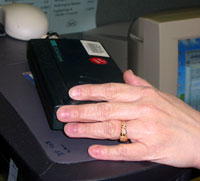
|
|
Debby Hill uses a DecTalk speech synthesizer that provides speech output from the computer.
|
My telephone and computer are very important tools that help me do my job effectively. I use a hands-free headset on my telephone. This helps prevent neck or shoulder problems that could result from extended periods of balancing a receiver on my shoulder. My computer is important because it’s where I store all of my phone logs and interview information. Because I am blind, I also use some special software and equipment that makes my computer more accessible.
Equipment and software I use:
- DecTalk Express - A speech synthesizer that provides almost human-sounding speech output from my computer. Since I cannot see the screen, the synthesizer speaks what appears on the computer screen.
- JAWS for Windows - A software package known as a screen reader that helps the DecTalk Express interpret the information to speak. It makes things like web pages and word processing in Windows much more accessible than if I had the speech synthesizer alone.
- PowerBraille Display - This is a piece of hardware that provides output in Braille from the computer. It interfaces with JAWS and shows what is on the screen, 65 Braille characters at a time. It comes in very handy when I am interviewing someone on the telephone. By using the PowerBraille, I don’t have to listen to a caller talking in one ear and the DecTalk talking in the other.
- VersaPoint Braille Printer and Duxbury Braille Translator Program - This hardware and software combination converts digital documents on my computer into Braille hard-copy documents. It comes in handy if I need to carry information from my computer to meetings.
- BrailleNote - This is a portable note taker that I can use to take notes and to carry electronic files from my computer to meetings, lectures, and training sessions. It has both speech output and an onboard 32-character Braille display.
- Scanner and Openbook Software - Sometimes I receive documents that are only in print. To make them more accessible, I use a scanner and the OpenBook software. Openbook is optical recognition software specifically written for people who are blind. It has many features for use when reading scanned printed material, such as formatting columnar text to make it easier to read. It also ignores pictures and graphics from the original so they don’t clutter up the text being read.
|
|
4. What I like best/least about my work...
|
Back to Top

|
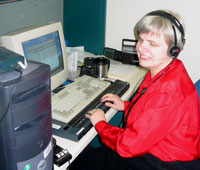
|
|
Debby Hilll working at her desk.
|
What I like best about my work is that my job is very unpredictable. I never know when I answer the phone what life-story I am going to hear, or what request or problem may be posed. It challenges me all of the time.
What I like least about my work is when I have to tell callers that they don’t qualify for any of our research studies and so we cannot admit them into a treatment program. Many times people are very disappointed and that makes me feel sad. At those times, I support them the best way I can, and give them referrals to find other treatment programs.
|
|
5. My career goals are..
|
Back to Top

|
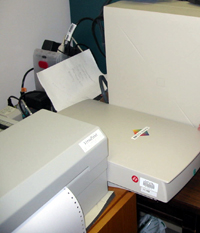
|
|
Debby Hill uses a VersaPoint braille printer.
|
My career goals are to get involved in two projects in our institute. I would like to help design a computerized database for storing, saving and organizing the logs and interview information I collect. Also, I would like to be able to conduct the psychological interviews that are administered to each patient in our research program. Currently, the interview questions and answer sheets are only in print and are not available to me, even using my specialized equipment and software. In the future, I would like to make them accessible and expand my role in the NIAAA research.
In the future I would like to teach in some capacity. I haven’t decided what form that will take, but I always remain open to new opportunities.
|
|
6. When I'm not working, I like to...
|
Back to Top

|
|
|
When I’m not working, I really enjoy talking to my husband and taking walks with him. He works in broadcasting, and since that is an interest of mine, we have a lot to talk about. We also enjoy watching and going to baseball games together.
I enjoy watching old movies, especially if they have been described. The description for some movies can be found on the Secondary Audio Program (SAP) channel on such networks as Turner Classic Movies. When you turn on the SAP channel, if a movie has been described, you can hear--in between the dialog in the film--a description of the characters, the environment and the action.
I also enjoy trying to identify birds by their songs. This is a hobby that has proved to be very challenging.
|
|
7. Advice on facing challenges to succeed...
|
Back to Top

|
|
|
It can be very difficult for someone who is blind or who has other disabilities to have a career, but I have been quite lucky and always had an interesting work life. After graduating with a B.A. degree in mathematics, I worked for one year as a seventh grade math teacher. At that time, we didn’t have computers in the classroom, so it was very challenging, but also a great experience. Next, I worked for the Navy with computers in various positions such as a mathematician, computer specialist, and computer systems analyst. Since I am a fairly organized person, I really enjoyed all of the computer programming and database work I did during those years.
After 13 years with the Navy, I decided to go back to school and become a social worker. Upon graduation, I became a director of a telephone crisis hotline. At that job, I learned a lot about being a supervisor and working with budgets. When the program lost its funding, I began to look for another job and found my current position at NIH.
As my career path illustrates, I think it’s important to be persistent and work hard. You never know what experiences and opportunities may come your way.
|
|
|
|
 |